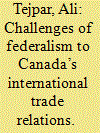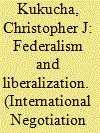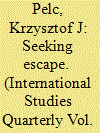|
|
|
Sort Order |
|
|
|
Items / Page
|
|
|
|
|
|
|
| Srl | Item |
| 1 |
ID:
103949


|
|
|
|
|
| Publication |
2011.
|
| Summary/Abstract |
This article investigates new opportunities that are emerging for Bangladesh with regard to her trade with India. In spite of the growing bilateral trade deficit, value of Bangladesh’s exports to India increased by about three times over the last five years. Examination of the dynamics of Bangladesh–India bilateral trade reveals that the number of products in Bangladesh’s export basket has registered significant increase, while at the same time, composition of the country’s exports to India has also shifted towards newer and non-traditional products. RCA analysis shows that export items with RCA > 1 in India, which include raw jute, chemical fertilizer, cement, RMG, leather, battery, textile fabrics and some other items, have significant export opportunities and have a combined potential market of US$ 2 billion in India. On the basis of examination of various tariff and nontariff barriers to trade with India, the article attempts to assess the economic implications of India’s sensitive list as it applies to Bangladesh, and argues that elimination of this list is not likely to have an adverse impact on India’s revenue earnings. The article also comes up with a number of recommendations to deal with the NTBs faced by Bangladesh in her trade with India, particularly in areas related to constraints arising from lack of trade facilitation.
|
|
|
|
|
|
|
|
|
|
|
|
|
|
|
|
| 2 |
ID:
170014


|
|
|
|
|
| Summary/Abstract |
New international agreements often recycle language from previous agreements, using boilerplate solutions alongside customized provisions. The presence of boilerplate in international agreements has important implications for understanding how international rules are made. The determinants behind boilerplate in international agreements have not previously been systematically evaluated. Using original data from a sample of 348 preferential trade agreements (PTAs) adopted between 1989 and 2009, we combine novel text analysis measures with Latent Order Logistic (LOLOG) graph network techniques to assess the determinants behind boilerplate in labor and environmental provisions commonly found in PTAs. Our results indicate that whereas boilerplate can be used for both efficiency and distributive purposes, international boilerplate is used primarily for efficiency gains and power-distribution considerations are not systematically important.
|
|
|
|
|
|
|
|
|
|
|
|
|
|
|
|
| 3 |
ID:
152502


|
|
|
|
|
| Summary/Abstract |
As one of the first “second-generation” free trade agreements that address indirect and non-tariff barriers, the Canada–European Union Comprehensive Economic and Trade Agreement (CETA) is likely to serve as an international model. CETA, however, highlights significant challenges for Canadian federalism in both the negotiation and implementation processes of this and any such future trade agreements. While the inclusion of sub-federal governments allows for provinces/territories to help shape the provisions that fall within their jurisdictions, this paper argues that subsequent challenges arise in conveying a unified Canadian commitment to implement the agreement. Overall, the CETA negotiations demonstrated the significant institutional weaknesses of current federal–provincial/territorial relations with respect to international trade agreements. In the Canadian context, this suggests a need for “summit federalism” to ensure that all federal–provincial/territorial governments align their terms and interests and convey a unified commitment to fulfilling Canada’s current and future international trade agreements.
|
|
|
|
|
|
|
|
|
|
|
|
|
|
|
|
| 4 |
ID:
153607


|
|
|
|
|
| Summary/Abstract |
While increasing trade and foreign direct investment, international trade agreements create winners and losers. Our paper examines the distributional consequences of preferential trade agreements (PTAs) at the firm level. We contend that PTAs expand trade among the largest and most productive multinationals by lowering preferential tariffs. We examine data covering the near universe of US foreign direct investment and disaggregated tariff data from PTAs signed by the United States. Our results indicate that US preferential tariffs increase sales to the United States from the most competitive subsidiaries of multinational corporations operating in partner countries. We also find increases in market concentration in partner countries following preferential liberalization with the United States. By demonstrating that the gains from preferential liberalization are unevenly distributed across firms, we shed new light on the firm-level, economic sources of political mobilization over international trade and investment policies.
|
|
|
|
|
|
|
|
|
|
|
|
|
|
|
|
| 5 |
ID:
153187


|
|
|
|
|
| Summary/Abstract |
This article argues that federal systems in Canada and the United States allow for the successful pursuit of sub-federal offensive and defensive priorities in the negotiation of international trade agreements. It is also clear, however, that the coercive American intrastate system limits the relevance of American states in this process, especially when compared to Canada’s relatively cooperative interstate model. Canadian provinces and territories also benefit from ideational considerations, including policy expertise and trust-ties with federal negotiators, which further strengthens sub-federal legitimacy and influence in this policy area. This study evaluates the incremental and significant impact of Canadian and American sub-federal governments across a number of sectors on the negotiations and final legal texts of the Canada-Korea Free Trade Agreement, the Canada-European Union Comprehensive Economic and Trade Agreement, and the Trans-Pacific Partnership.
|
|
|
|
|
|
|
|
|
|
|
|
|
|
|
|
| 6 |
ID:
117853


|
|
|
|
|
| Publication |
2012.
|
| Summary/Abstract |
A burgeoning body of literature assesses the sociopolitical factors that influence investment decisions, including the nature of domestic institutions, societal rights, and participation in international institutions and agreements. Oddly enough, these have evolved largely as separate lines of research, and little effort has been made to compare the relative importance of these sociopolitical factors in making investment decisions. Moreover, though the diverse nature of foreign direct investment (FDI) is widely noted, extant research relies almost exclusively upon the examination of aggregate FDI. As a result, scholars have little insight into the ways that investors prioritize these factors, or how they vary across different industries. In an effort to synthesize these strands of research and further deepen our understanding of the determinants of investment decisions, this study models the prospective impact of several sociopolitical variables that have been found to significantly influence FDI-human rights, democratic governance, and commitment to international trade agreements and investment treaties-across multiple investment sectors.
|
|
|
|
|
|
|
|
|
|
|
|
|
|
|
|
| 7 |
ID:
089038


|
|
|
|
|
| Publication |
2009.
|
| Summary/Abstract |
In agreements that include flexibility enhancing mechanisms such as escape clauses, how do institutions realize the benefits of flexibility while preventing its abuse? The conventional wisdom is that escape clauses must be made costly, but I show this claim to be at odds with empirical observation. In the GATT/WTO, the institution where escape clauses are most prevalent, compensation following escape was only widespread in the 1950s. Since then, it has been progressively abandoned, in favor of appeals to exception. This alternative mechanism relies on an institution's ability to verify the severity and exogeneity of the domestic circumstances of states seeking temporary escape. Relying heavily on GATT archives, I show how early on in the institution, members had made the link between costless escape and increased monitoring, and pursued reforms to achieve both objectives. The success of members' ability to verify escapees' domestic circumstances is observed in the record of safeguard disputes throughout the GATT/WTO's history. Finally, I use the hypothesized link between verifiable information and the chosen escape mechanism to explain an otherwise puzzling GATT incident, that of French emergency trade measures in 1968.
|
|
|
|
|
|
|
|
|
|
|
|
|
|
|
|
| 8 |
ID:
022250


|
|
|
|
|
| Publication |
Summer 2002.
|
| Description |
477-513
|
|
|
|
|
|
|
|
|
|
|
|
|
|
|
|
|
|
|
|
|